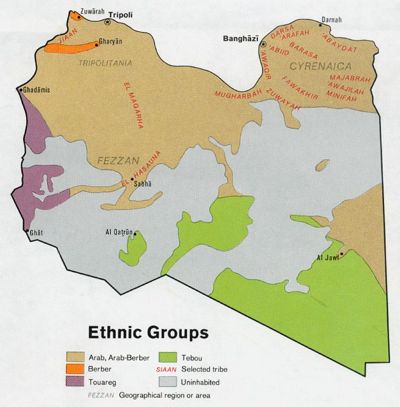Libya: Difference between revisions
imported>Ro Thorpe m (rephrase) |
John Leach (talk | contribs) m (Text replacement - "UNIFIED PROTECTOR" to "Unified Protector") |
||
| (14 intermediate revisions by 6 users not shown) | |||
| Line 1: | Line 1: | ||
{{subpages}} | {{subpages}} | ||
'''Libya''' ([[Arabic language|Arabic]]: ليبيا, ''Libiya'') is a state of Northern [[Africa]], located between the [[Mediterranean Sea]], [[Tunisia]], [[Algeria]], [[Niger]], [[Chad]], [[Sudan]] and [[Egypt]]. The capital is [[Tripoli, Libya|Tripoli]]. Libya has 1 759 540 km² and 6 461 454 inhabitants.<ref> | {{TOC|right}} | ||
'''Libya''' ([[Arabic language|Arabic]]: ليبيا, ''Libiya'') is a state of Northern [[Africa]], located between the [[Mediterranean Sea]], [[Tunisia]], [[Algeria]], [[Niger]], [[Chad]], [[Sudan]] and [[Egypt]]. The capital is [[Tripoli, Libya|Tripoli]]. Libya has 1 759 540 km² and 6 461 454 inhabitants.<ref name=FB>{{citation | |||
| url = https://www.cia.gov/library/publications/the-world-factbook/geos/ly.htmlCIA | |||
| title = The World Factbook: Libya | |||
| year = 2011 | |||
| publisher = [[Central Intelligence Agency]]}}</ref> Its official language is Arabic. | |||
Historically, and since Antiquity, '''Libya''' has been viewed as a country located west of Egypt with an imprecise extension. Some ancient Greek authors even | Historically, and since Antiquity, '''Libya''' has been viewed as a country located west of Egypt with an imprecise extension. Some ancient Greek authors even used the name Libya (''Λιβύη, Libýē'') for the whole area of the African continent stretching between Egypt and the Atlantic Ocean. | ||
==Current conflict== | |||
In 2011, the Libyan state was divided between: | |||
* Rebel forces supporting the popular uprising that began in February 2011. They are represented by an ''[[Transitional National Council]]''. This council names the state temporarily the ''Libyan Republic'' (Arabic: الجمهورية الليبية, ''Al Jumhuriyya Al Libiyya'').<ref>See the website of the [http://ntclibya.org/english/ Interim National Transitional Council].</ref> | |||
* The authoritarian state led by Colonel [[Muammar Gaddafi]] (more precisely Al Qadhdhafi) since a coup in 1969. Since 1977, this power has officially called the state the ''Great Socialist People's Libyan Arab Jamahiriyya'', where ''jamahiriyya'' is a neologism coined by Gaddafi, meaning "state of the masses" (Arabic: الجماهيرية العربية الليبية الشعبية الاشتراكية العظمى, ''Al Jamahiriyya Al Arabiyya Al Libiyya Ash Shabiyya Al Ishtirakiyya Al Uthma''). | |||
Pursuant to [[United Nations Security Council]] Resolution 1973, a coalition of nations began [[Operation Odyssey Dawn]] military operations against Gaddafi's regime in Libya in March 2011. The declared purpose is to protect civilians from the Gaddafi government. The U.S.-led ODYSSEY DAWN is transitioning to a NATO-led [[Operation Unified Protector]] and a yet-unnamed, UN-authorized but non-NATO operation. | |||
Libyan opposition forces took control of most of Libya by October 2011, with a key moment being the death of Gaddafi at [[Sirte]]. | |||
[[Image:Libya ethnic 1974.jpg|thumb|right|400px|Ethnic groups of Libya]] | |||
==Population== | |||
Population is estimated as under 6 million, 97% identified as [[Arab]] or [[Berber]]. | |||
==Notes== | ==Notes== | ||
{{reflist}} | {{reflist}} | ||
Latest revision as of 08:38, 21 March 2024
Libya (Arabic: ليبيا, Libiya) is a state of Northern Africa, located between the Mediterranean Sea, Tunisia, Algeria, Niger, Chad, Sudan and Egypt. The capital is Tripoli. Libya has 1 759 540 km² and 6 461 454 inhabitants.[1] Its official language is Arabic.
Historically, and since Antiquity, Libya has been viewed as a country located west of Egypt with an imprecise extension. Some ancient Greek authors even used the name Libya (Λιβύη, Libýē) for the whole area of the African continent stretching between Egypt and the Atlantic Ocean.
Current conflict
In 2011, the Libyan state was divided between:
- Rebel forces supporting the popular uprising that began in February 2011. They are represented by an Transitional National Council. This council names the state temporarily the Libyan Republic (Arabic: الجمهورية الليبية, Al Jumhuriyya Al Libiyya).[2]
- The authoritarian state led by Colonel Muammar Gaddafi (more precisely Al Qadhdhafi) since a coup in 1969. Since 1977, this power has officially called the state the Great Socialist People's Libyan Arab Jamahiriyya, where jamahiriyya is a neologism coined by Gaddafi, meaning "state of the masses" (Arabic: الجماهيرية العربية الليبية الشعبية الاشتراكية العظمى, Al Jamahiriyya Al Arabiyya Al Libiyya Ash Shabiyya Al Ishtirakiyya Al Uthma).
Pursuant to United Nations Security Council Resolution 1973, a coalition of nations began Operation Odyssey Dawn military operations against Gaddafi's regime in Libya in March 2011. The declared purpose is to protect civilians from the Gaddafi government. The U.S.-led ODYSSEY DAWN is transitioning to a NATO-led Operation Unified Protector and a yet-unnamed, UN-authorized but non-NATO operation.
Libyan opposition forces took control of most of Libya by October 2011, with a key moment being the death of Gaddafi at Sirte.
Population
Population is estimated as under 6 million, 97% identified as Arab or Berber.
Notes
- ↑ The World Factbook: Libya, Central Intelligence Agency, 2011
- ↑ See the website of the Interim National Transitional Council.
